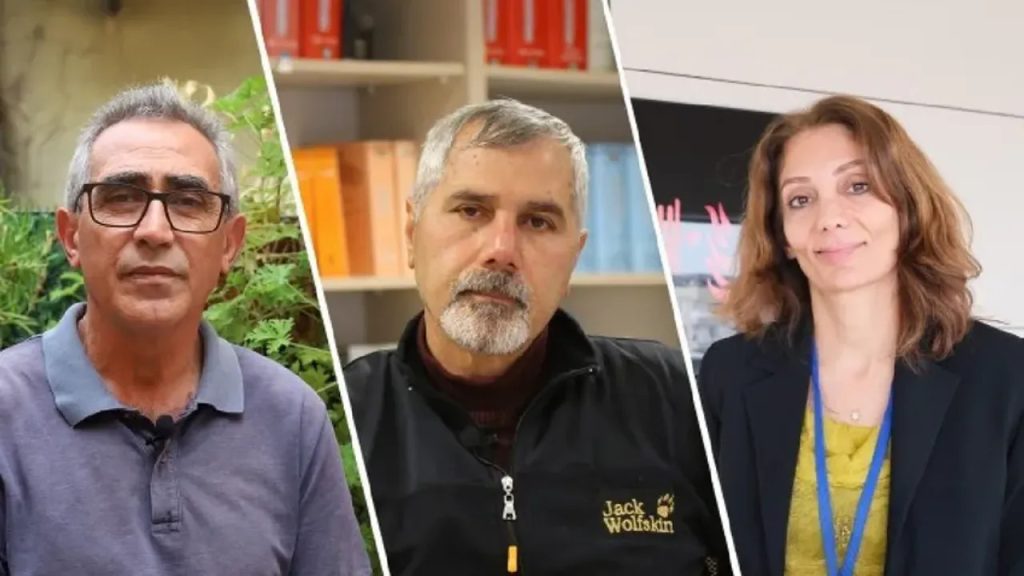Turkish authorities conducted early morning raids on March 5, detaining four prominent Kurdish writers as part of an ongoing investigation led by the Istanbul Chief Public Prosecutor’s Office. The arrests have sparked significant criticism from the pro-Kurdish Peoples’ Equality and Democracy (DEM) Party, which views the operation as an infringement upon cultural freedoms and a setback for peace initiatives. Those taken into custody include Mevlüt Aykoç, Sami Tan, and Ronahî Önen, who have been linked to the Kurdish language teaching resource “Hînker,” which has played a crucial role in Kurdish education.
| Article Subheadings |
|---|
| 1) Background of the Detained Writers |
| 2) Significance of the “Hînker” Book |
| 3) Authorities’ Justification for the Arrests |
| 4) Reaction from the Peoples’ Equality and Democracy (DEM) Party |
| 5) Implications for the Future of Kurdish Culture |
Background of the Detained Writers
The individuals taken into custody – Mevlüt Aykoç, Sami Tan, and Ronahî Önen – are well-known figures in Kurdish literature and cultural advocacy. These writers have dedicated their careers to the promotion of Kurdish language and literacy, often facing adversity due to the political environment concerning Kurdish identity in Turkey. Their arrest is part of a broader pattern of crackdowns on cultural activists in the region, a situation that has been increasingly tense as Turkey attempts to navigate its own national identity while addressing ethnic minorities.
Significance of the “Hînker” Book
The “Hînker” book serves as a crucial educational tool aimed at teaching the Kurdish language. First published in 2008, it has been utilized by various Kurdish institutions to support language courses. The book is particularly noted for being part of the curriculum in officially recognized private Kurdish language schools established in 2005. It has thus gained a reputation for aiding in the preservation and promotion of Kurdish linguistic heritage, amidst government efforts that often strive to suppress such endeavors. The importance of “Hînker” extends beyond mere pedagogy; it symbolizes a cultural resistance against assimilation and a commitment to sustaining the Kurdish language.
Authorities’ Justification for the Arrests
Turkish authorities have claimed that the detention of these writers is warranted due to their involvement with the “Hînker” book. The prosecutors allege that the book promotes separatism and anti-government sentiment. Police have cited earlier searches conducted in 2023 where material related to “Hînker” was discovered, framing it as evidence of the writers’ alleged anti-state activities. This rationale for detention raises considerable concerns about freedom of expression and artistic freedom, particularly given the historical context of repression faced by the Kurdish community in Turkey.
Reaction from the Peoples’ Equality and Democracy (DEM) Party
The People’s Equality and Democracy Party (DEM) issued a vehement condemnation of the arrests, calling them anti-democratic acts aimed at undermining the hopes for peace in Turkey. In a statement, the party expressed skepticism regarding the government’s commitment to democracy and inclusivity for the Kurdish people. They emphasized that the detentions target not only the individuals involved but also the broader movement of Kurdish cultural preservation, which is considered vital in contemporary Turkey. DEM’s denunciation reflects widespread apprehensions about the implications of these actions on the ongoing dialogue for peace within the country.
Implications for the Future of Kurdish Culture
The recent detentions raise significant questions about the future of the Kurdish language and culture in Turkey. With ongoing conflicts surrounding Kurdish identity and rights, the arrests of prominent writers signal potential setbacks in cultural advocacy and political reconciliation efforts. This situation reflects a broader cultural climate where expressions of Kurdish identity are met with resistance, impacting generations striving to preserve their linguistic heritage. The DEM’s call for the release of these writers is not merely a plea for individual freedom; it is a demand for the recognition of Kurdish culture as a legitimate and valued aspect of Turkey’s diverse social fabric.
| No. | Key Points |
|---|---|
| 1 | Four Kurdish writers were detained on March 5, 2023, during raids linked to ongoing investigations. |
| 2 | The writers are involved in the creation of “Hînker,” an educational resource for Kurdish language instruction. |
| 3 | The detainees have been accused of promoting separatism through their work related to the “Hînker” book. |
| 4 | The DEM Party has condemned the arrests as unlawful and aimed at undermining the Kurdish cultural movement. |
| 5 | The detentions highlight enduring challenges faced by the Kurdish community in maintaining their cultural identity. |
Summary
The recent arrests of Kurdish writers underscore a critical juncture in Turkey’s ongoing struggle with ethnic diversity and cultural expression. As authorities justify these actions through a lens of national security, the implications for artistic freedom and cultural advocacy remain profoundly concerning. The response from the DEM Party highlights the urgent need for a more inclusive dialogue fostering peace and collaboration. The fate of Kurdish cultural preservation hangs in a delicate balance, calling for immediate attention to the rights of individuals seeking to promote their language and heritage in an often-hostile environment.
Frequently Asked Questions
Question: Who were the writers detained in Turkey?
The detained writers include Mevlüt Aykoç, Sami Tan, and Ronahî Önen, known for their contributions to Kurdish literature and education.
Question: What is the significance of the “Hînker” book?
The “Hînker” book is a key educational resource that aids in teaching the Kurdish language, widely used in Kurdish language courses across Turkey.
Question: What has been the response from the Kurdish community regarding these arrests?
The response has been overwhelmingly critical, with the DEM Party condemning the detentions as attempts to stifle Kurdish culture and language, especially during a time of hope for peace.


